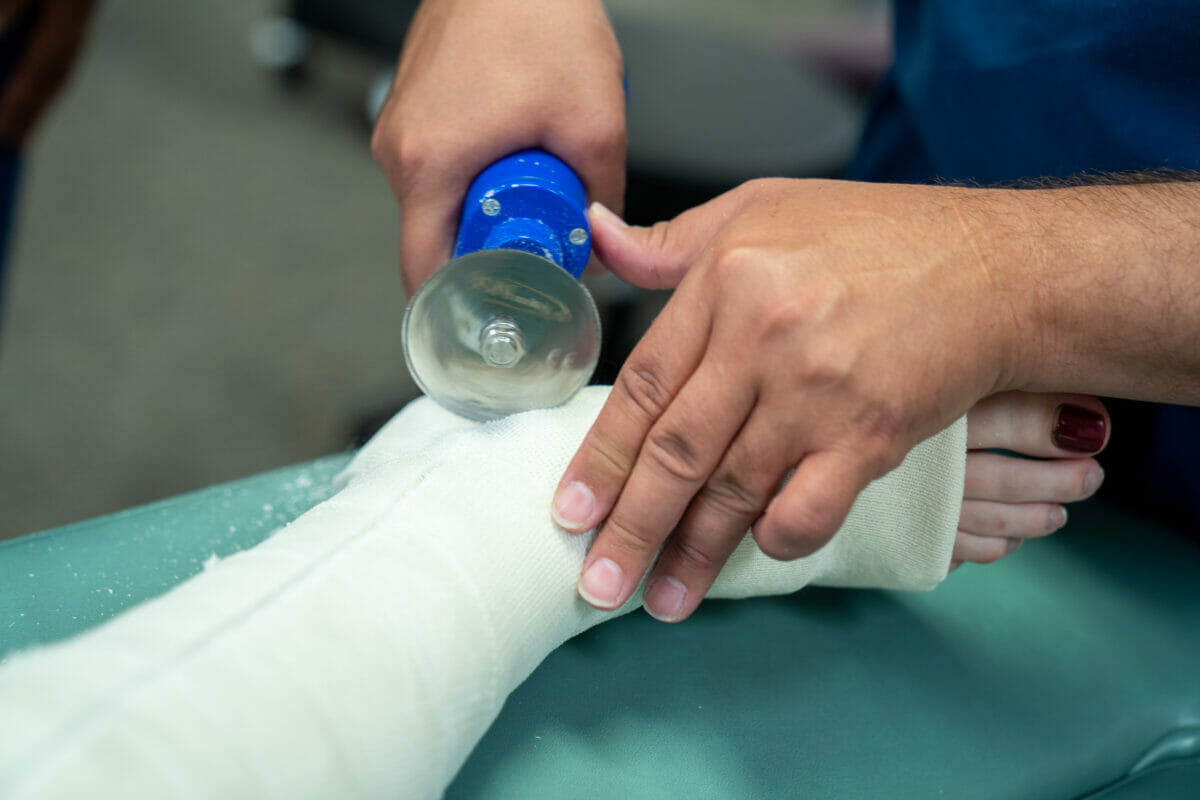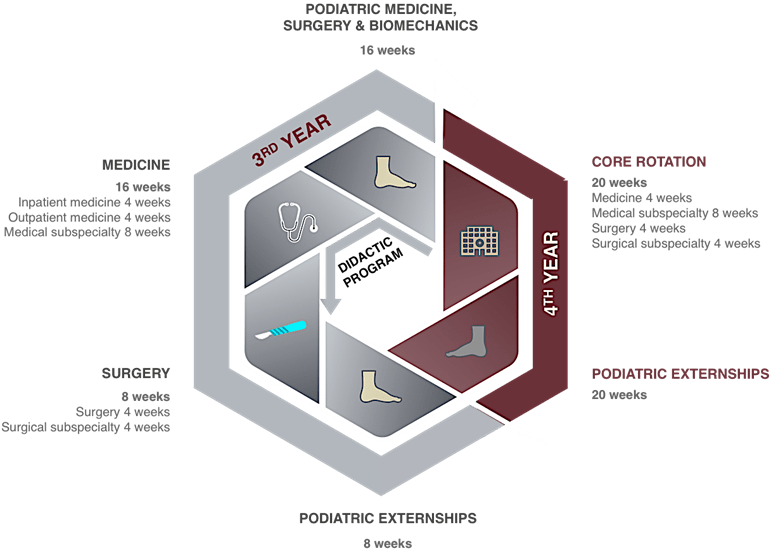
Curriculum
After completing podiatric medical school, graduates go through a three-year hospital-based residency program to practice in the vast majority of states. Students leave WesternU with the preparation they need to excel in the field.

You Will Practice Cutting Edge Podiatric Medicine
Curriculum Overview
The first two years focus on the foundations of medicine in the classroom and small group activities, hands-on workshops, and standardized patients. The third and fourth years focus on clinical rotations learning to care for patients firsthand.
Pre-Clinical Education
1st-year focus: Normal functions of the body, health, and wellness.
2nd-year focus: Restoration of health, diagnosis, and treatment.
We present the material in integrated blocks of the sciences and clinical skills. Students also have podiatric specific courses and a two-year comprehensive course to help prepare for the boards.
Clinical Education
In the third year, students complete clinical rotations in medicine, surgery and podiatric medicine; and surgery and biomechanics at core LA area hospitals. Students also participate in a weekly didactic and skills session. Podiatric externships begin the last two months of the third year at residency programs around the country.
During the fourth year, students complete five podiatric externships followed by a didactic month. The final five months of the curriculum are spent at a core hospital on rotations in various medical and surgical specialties.

CONFERENCE WEEKS
The students will also partake in a unique process of longitudinal professional development whereby students can select topics of interest to personalize their growth as a student doctor; all of which makes for a highly dynamic and very strong experience for all students. Wellness and professionalism activities were intentionally embedded strategically throughout the years of training. The conference week framework mimics that of a professional development conference. Student attendees may choose from a variety of wellness-based and professional development activities designed to expand their skillsets as future physicians, as well as promote their overall well-being. As physicians in the future, students will be expected to manage their continuing education activities by individual choice. The conference week provides multiple opportunities throughout their first two years to build this important skillset.
PMS I – Fall Semester
Courses are organized into integrated blocks or longitudinal series designed to reinforce repetition while adding layered complexity as students advance.
BLOCKS
Introduction to the Study of Medicine (ISOM):
Foundational Topics: Anatomy, Histology, Biochemistry, Genetics, Cell Biology, Clinical Medicine
Foundations of Medicine 1 (FOM 1):
An Integrated Approach to:
- Foundational Topics: Anatomy, Histology, Physiology, Biochemistry, Immunology, Genetics, Molecular Biology, Developmental Biology
- Organ Systems: Musculoskeletal, Dermatology, Hematology
- Clinical Skills: Medical Reasoning, Humanism and Patient Care Skills
Foundations of Medicine 2 (FOM 2):
An Integrated Approach to:
- Foundational Topics: Anatomy, Histology, Physiology, Genetics, Biochemistry, Molecular Biology, Developmental Biology
- Organ Systems: Neurologic & Behavioral Medicine
- Clinical Skills: Medical Reasoning, Humanism and Patient Care Skills
Assessment Weeks:
Occur at the end of every block. Topics include; Clinical Skills Practicals, Anatomy Practical and Integrated computerized written examination.
Conference Weeks:
Occur after each Assessment week. Topics include: Professional Development, Wellness, Longitudinal Track activities, Systems Based Practice, Professionalism, Patient Care & Podiatric Procedural Skills, Practice Based Learning & Improvement, and Interpersonal & Communication skills.
Examples of sessions offered: applied biomechanics, local hiking trips, sports medicine, pain management, yoga, ultrasound techniques, suture and AO internal fixation workshops, etc.
LONGITUDINAL SERIES
Podiatric Medicine, Principles, and Practice I (PMP 1):
An integrated approach to podiatric medicine and surgery beginning with foundational topics: Lower Extremity Anatomy, Biomechanics, Radiology and Diagnostic Imaging
Integrated Skills for the Study of Medicine 1 (ISSM 1):
Longitudinal course that incorporates the conference week activities, the high yield review, and National board preparation activities with National Board practice examinations
Interprofessional Education (IPE):
Occurs throughout each semester. IPE presents a dynamic opportunity for learners from various health professions to engage and interact virtually, while actively exploring the ways collaborative health care teams operate.
PMS I – Spring Semester
Courses continue to be organized into integrated blocks or longitudinal series designed to reinforce repetition while adding layered complexity as students advance.
BLOCKS
Foundations of Medicine 3 (FOM 3):
An Integrated Approach to:
- Foundational Topics: Anatomy, Histology, Physiology, Biochemistry
- Organ Systems: Cardiovascular, Respiratory, Renal
- Clinical Skills: Medical Reasoning, Humanism and Patient Care Skills
Foundations of Medicine 4 (FOM 4):
An Integrated Approach to:
- Foundational Topics: Anatomy, Physiology, Biochemistry
- Organ Systems: Gastrointestinal, Endocrine, Reproductive
- Clinical Skills: Medical Reasoning, Humanism and Patient Care Skills
Assessment Week and Conference Week continues after each block.
LONGITUDINAL SERIES
Podiatric Medicine, Principles, and Practice II (PMP 2):
An integrated approach to foundational topics in podiatric medicine & surgery: Dermatology, Forefoot Pathology, Rheumatology in the Foot and Ankle, Heel Pain and Introduction to Rearfoot Pathology.
Integrated Skills for the Study of Medicine 2 (ISSM 2) – High Yield Review:
Longitudinal Course that incorporates the conference week activities, the high yield review, and National board preparation activities with National Board practice examinations. ISSM 2 has high yield content review of topics covered in the first-year curriculum capped by a cumulative national standardized examination.
PMS II – Fall Semester
Courses continue to be organized into integrated blocks or longitudinal series designed to reinforce repetition while adding layered complexity as students advance.
BLOCKS
Advanced Study of Medicine (ASOM):
Foundational Topics: Pathology, Microbiology/Immunology, Pharmacology, Clinical Medicine
Foundations of Medicine 5 (FOM 5):
An Integrated Approach to:
- Foundational Topics: Pathology, Pathophysiology, Microbiology/Immunology, Pharmacology, Biostatistics
- Organ Systems: Cardiovascular, Respiratory, Renal
- Clinical Skills: Medical Reasoning, Humanism and Patient Care Skills
Foundations of Medicine 6 (FOM 6):
An Integrated Approach to:
- Foundational Topics: Pathology, Pathophysiology, Microbiology/Immunology, Pharmacology, Biostatistics
- Organ Systems: Dermatology, Musculoskeletal, Hematology
- Clinical Skills: Medical Reasoning, Humanism and Patient Care Skills
Assessment Week and Conference Week continues after each block.
LONGITUDINAL SERIES
Podiatric Medicine, Principles, and Practice III (PMP 3):
An integrated approach to foundational topics in podiatric medicine & surgery: The Diabetic Foot, Pathology of the Midfoot, Pes Planus and Pes Cavus
Integrated Skills for the Study of Medicine 3 (ISSM 3):
Longitudinal Course that incorporates the conference week activities, the high yield review, and National board preparation activities with National Board practice examinations
PMS II – Spring Semester
Courses continue to be organized into integrated blocks or longitudinal series designed to reinforce repetition while adding layered complexity as students advance.
BLOCKS
Foundations of Medicine 7 (FOM 7):
An Integrated Approach to:
- Foundational Topics: Pathology, Pathophysiology, Microbiology/Immunology, Pharmacology, Biostatistics
- Organ Systems: Gastroenterology, Endocrine, Reproductive
- Clinical Skills: Medical Reasoning, Humanism and Patient Care Skills
Foundations of Medicine 8 (FOM 8):
An Integrated Approach to:
- Foundational Topics: Pathology, Pathophysiology, Biostatistics, Pharmacology, Histology
- Organ Systems: HEENT, Neurology, Psychiatry and Behavioral Medicine
- Clinical Skills: Medical Reasoning, Humanism and Patient Care Skills
Assessment Week and Conference Week continues after each block.
LONGITUDINAL SERIES
Podiatric Medicine, Principles, and Practice IV (PMP 4):
An integrated approach to foundational topics in podiatric medicine & surgery: Trauma, Pediatric Foot and Ankle Pathology, Bone and Soft Tissue Tumors, and Complications
DEDICATED BOARD STUDY:
The students are given dedicated time to prepare for their APMLE Part 1 National Board examination under the guidance of a faculty board advisor.
Integrated Skills for the Study of Medicine 4 (ISSM 4) – High-Yield Review:
Longitudinal Course that incorporates the conference week activities, the high yield review, and National Board preparation activities with National Board practice examinations. ISSM 4 has high yield content review on topics covered in the second-year curriculum capped by a cumulative national standardized examination.
The majority of the third-year curriculum occurs in Southern California hospitals. Medicine and surgery rotations are located at core hospitals and podiatric medicine, surgery and biomechanics rotations rotate through five clinical sites. During these clinical rotations, students also participate in a weekly didactic session. The concluding months of the third year are spent at podiatric medicine and surgery externships frequently located outside of Southern California.
Core Rotation
The core rotation is designed to ensure CPM students have a broad range of medicine and surgery experiences, helping hone your medical decision-making ability and hone your clinical skills. The variety of clinical experiences train you to become a well-rounded podiatric physician who can appropriately care for the patient by seeing beyond the foot and ankle and understanding interdisciplinary, collaborative practice.
Core rotations include either Greater Los Angeles hospitals (Olive View-UCLA Medical Center and Department of Veterans Affairs Medical Center-Greater Los Angeles) or the Inland Empire hospitals (Riverside University Health System, Arrowhead Regional Medical Center, Pomona Valley Hospital Medical Center and Chino Valley Medical Center). You may also rotate hospitals involved with both core sites: Harbor-UCLA Medical Center, Long Beach Memorial Medical Center and Keck-USC University Hospital.
During the core rotation, students have the following four-week rotations:
- Inpatient medicine
- Outpatient (ambulatory) medicine
- Medical subspecialty (two of the following
- Infectious disease
- Interprofessional
- Multi-specialty clinics
- Pediatrics
- Psychiatric medicine
- Radiology
- Rheumatology
- General Surgery
- Surgery subspecialty (one of the following)
- Orthopedic surgery
- Plastic surgery
- Surgery
- Surgery subspecialty clinics
- Urology
- Vascular surgery
Podiatric Medicine and Surgery
Students spend four months on podiatric medicine and surgery. The first clinical rotation is in June at the WesternU Health Foot & Ankle Center. The remaining time is divided into three (3) four-week rotations at the following locations:
- WesternU Health Patient Care Center, Foot & Ankle Center & Arrowhead Regional Medical Center
- Riverside University Health System
- Olive View-UCLA Medical Center & Department of Veterans Affairs (DVA) Medical Center-Greater Los Angeles
Podiatric Medicine and Surgery Externships
Podiatric externships begin the final two months of the third year (April and May). These are four week rotations at hospitals often affiliated with a podiatric residency program.
Didactic Programs
From the start of the third year until leaving for podiatric externships, students participate in a weekly didactic program to reinforce podiatric medical concepts, expand their depth of knowledge and improve their oral presentation skills. Students also participate in weekly radiology grand rounds, journal club and case conference.
Podiatric Medicine and Surgery Externships
During the fourth year, students complete five months of podiatric medicine externship at hospitals around the country. The externships are usually at hospitals with residency programs so you will have exposure to up to seven externships prior to residency interviews.
Didactic Programs
The didactic program is a four-week program in December designed to help prepare students for the APMLE Part II board examination and for residency interviews. This includes mock interviews with personalized feedback provided by the clinical education department.
Core Rotation
The remaining five months are at a core rotation site. The clinical rotations include medicine, medical subspecialties and surgical subspecialties. The specific subspecialty rotations vary by core hospital. The core sites include:
- DVA – Albuquerque
- MedStar Washington Hospital Center
- DVA – Eastern Colorado
- DVA – Albuquerque
- DVA – Greater Los Angeles, Olive View-UCLA Medical Center
- West Penn Hospital
- DVA – Phoenix
- WesternU Core (Arrowhead Regional Medical Center and Riverside University Health System)
- DVA – Salt Lake City/Intermountain Medical Center

